WASHINGTON ― Easily the most lasting legacy of President Donald Trump’s first term is how he reshaped the nation’s federal courts.
He confirmed 234 lifetime federal judges ― more than any of his recent predecessors, though one shy of President Joe Biden’s 235 ― and he benefited from a well-oiled machine put in place for him by conservatives. Leonard Leo, a powerful right-wing legal activist tied to The Federalist Society, fed Trump dozens of anti-LGBTQ+ and anti-abortion picks. When Trump sent them to the Senate, then-Majority Leader Mitch McConnell (R-Ky.) made their confirmations a top priority and strong-armed them through, Senate rules be damned.
But in his second term, with his first batch of judicial nominees heading into their Senate hearing on Wednesday, Trump is approaching this process more vengeful, more unhinged and with fewer opportunities to drastically remake the courts. He’s facing a changed political landscape on everything from alliances made and broken to different Senate interests, all of which combine to set the stage for a new strategy for confirming judges.
For one thing, Trump isn’t inheriting that same well-oiled machine from before. McConnell isn’t in charge of the Senate now; it’s Sen. John Thune (R-S.D.), who is far less animated by confirming judges (and has his hands full with Trump’s other second-term chaos).
He still has a GOP-led Senate, which he’ll need for getting his judges confirmed. At the start of his first term, McConnell gave him the gift of 108 judicial vacancies to fill after years of leading Republicans in blocking President Barack Obama’s picks for those seats, most notably the Supreme Court seat left vacant by Antonin Scalia’s death in 2016, in order to keep them open for a future GOP president to fill. It worked.
But he doesn’t have nearly as many court vacancies to fill this time around. As of Tuesday, Trump has less than half of what he had before, with 49 open judicial seats.
Those are just the mechanics of the situation. In terms of strategy, Trump relied heavily on Leo to pick his nominees in his first term. These days, the president has been calling Leo “a sleazebag” for seemingly betraying him by recommending nominees to him who have gone on to become federal judges who have ruled against him in courts.
In a bizarre rant on Thursday, Trump blamed Leo for a panel of judges on the U.S. Court of International Trade ruling that he didn’t have unilateral authority to impose tariffs on most countries — a big setback to Trump’s international economic policy. One of the three judges on the panel had been appointed by Trump.
“I was new to Washington, and it was suggested that I use The Federalist Society as a recommending source on Judges,” the president said on social media. “I did so, openly and freely, but then realized that they were under the thumb of a real ‘sleazebag’ named Leonard Leo, a bad person who, in his own way, probably hates America, and obviously has his own separate ambitions.”
“I am so disappointed in The Federalist Society because of the bad advice they gave me on numerous Judicial Nominations,” he added. “This is something that cannot be forgotten!”
What’s becoming clear about his new strategy for picking judicial nominees is that he wants them to all have one quality: loyalty to him. Or at least, he has to believe they will.
Mike Davis, a conservative lawyer who has advised the administration on judicial picks and who previously served as nominations counsel to Sen. Chuck Grassley (R-Iowa), has signaled that Trump is ready to move beyond the already highly ideological picks from the Federalist Society.
People should expect Trump to pick “even more bold and fearless nominees” this time around, Davis said last month in a Fox News opinion piece. “He will look beyond the garden-variety Federalist Society choices and install a new generation of judicial titans who will change the landscape for generations to come in line with our Founders’ intent.”
This pivot is best exemplified by Trump’s pick of Deputy Attorney General Emil Bove for an open seat on the Third Circuit Court of Appeals. Bove is not a Federalist Society luminary, nor does he have the conservative credentials that all of Trump’s past picks had. But he did work as Trump’s personal lawyer and has acted as a hatchet-man at the Department of Justice, spear-heading the corrupt deal to end the prosecution into New York Mayor Eric Adams that led to multiple conservative lawyers leaving the department in a rage.
Bove’s appointment has already caused significant strife in the conservative legal world, with old guard luminaries criticizing the Bove selection, and Davis and other Trump-aligned lawyers hitting back.
In a post at The National Review, Ed Whelan, an insider conservative legal activist at the Ethics and Public Policy Center, called Bove a “henchman” and questioned whether nominating someone of his caliber “might well deter some sitting judges from stepping down from active service to create more vacancies that Trump could fill.”
Davis fired back in The Federalist, calling Whelan an “establishment stooge.”
Then, in a longer piece noting his “serious doubts that Bove has the character and integrity to be worthy of confirmation as a federal judge,” Whelan pointed out that his nomination could put him on a fast-track to the Supreme Court, and called on Republican senators “who have the foresight and sense to prevent this scenario” and defeat Bove’s nomination.
“In the past, the most vigorous clashes over judges happened between the left and the right,” Josh Blackman, a conservative legal activist who often speaks for the most conservative faction of the conservative legal movement, wrote in response to the kerfuffle over Bove. “I think the next round of wars will be on the right. The left can sit back and enjoy the fireworks.”

WIN MCNAMEE via Getty Images
Already, Trump is reportedly mad that his Supreme Court appointees haven’t been loyal enough to him. In particular, he’s apparently unhappy with Justice Amy Coney Barrett, who some of his allies have reportedly been telling him is “weak” and her rulings haven’t been in line with how she presented herself as a nominee in 2020, per CNN.
Barrett has drawn the ire of people in Trump’s orbit with some of her rulings, like in March, when she and Chief Justice John Roberts joined the court’s more liberal faction in blocking the administration’s effort to cancel nearly $2 billion in foreign aid.
The president’s first five judicial nominees testifying to the Senate Judiciary Committee on Wednesday more or less fit the bill of his first-term picks: They all have records of attacking abortion rights, LGBTQ+ rights and civil rights. They’re all white. They’ve all faced condemnation from progressive and nonpartisan groups for being too extreme.
But what’s different is Trump 2.0 is motivated entirely by vengeance. Between his reckless attacks on federal judges who rule against him, his efforts to strip billions in federal dollars from Harvard University for not bowing to his demands, and his mass firings of federal prosecutors involved in Jan. 6 criminal cases, Trump has already demonstrated that he plans to abuse his position to threaten and punish anyone who doesn’t side with him.
It’s too early to know how his campaign of retribution will play out with his judicial picks. He is, after all, picking people for lifetime federal judgeships. It’s also impossible to know if his current judicial nominees have made any kind of pledge of loyalty to Trump in order to be picked. But it’s not a stretch to say his choices will likely be guided by his same dark, aggrieved compulsion to surround himself with people he believes will always agree with him, regardless of laws. His choice of Bove for a crucial appeals court seat is evidence that Trump will shake up the long-laid plans of the conservative legal movement to put cronies who will do his bidding in the most important judicial positions.
Some groups think it’s already happening, even if there’s no evidence to back it up.
“Donald Trump is picking up where he left off in his first term by using judicial nominees to advance an extreme agenda that undermines Americans’ fundamental freedoms,” Caroline Ciccone, president of the nonpartisan watchdog group Accountable.US, said in a statement. “But this time, Trump is selecting nominees with personal allegiances to the President, who will go even further in using the bench to cut off Americans’ rights.”
Last week, Attorney General Pam Bondi informed the American Bar Association that she’s cutting it out of the vetting process for Trump’s judicial nominees because she thinks the organization is an “activist group.” In fact, the ABA is a voluntary bar association of lawyers and law students that has played a role in vetting judicial picks for decades.
Illinois Sen. Dick Durbin, the top Democrat on the Senate Judiciary Committee, called Bondi’s move “blatantly political,” and said she’s trying to provide cover to extreme and unqualified nominees “who would crumble” under a nonpartisan review by their peers.
That already appears to be the case for one of Trump’s judicial nominees in Wednesday’s hearing, Joshua Divine. He lacks the bare minimum amount of legal experience to be a lifetime federal judge, per the ABA’s standards. (This was a recurring and embarrassing problem with Trump’ judicial picks in his first term.)
Divine also stands out for previously serving as chief counsel to Sen. Josh Hawley (R-Mo.), who is a member of the judicial panel. Another curious detail from Divine’s past: He argued in a 2010 college opinion piece that people should be required to take literacy tests in order to vote — despite such tests being outlawed by the Voting Rights Act of 1965 because they were routinely used to keep Black people from voting.
Four of the five are Missouri district court picks recommended by Hawley. The fifth is Whitney Hermandorfer, up for a seat on the U.S. Court of Appeals for the Sixth Circuit, which has jurisdiction in Kentucky, Ohio, Michigan and Tennessee. She previously clerked for three of the Supreme Court’s conservative justices, including two of Trump’s appointees.
Hermandorfer, who is the director of strategic litigation for the Tennessee Attorney General’s office, previously defended her state’s near-total ban on abortion. She also tried to dismantle gender identity protections. In one case, she challenged a federal rule requiring the Affordable Care Act’s prohibition on sex discrimination to include discrimination based on gender identity. She’s drawn significant opposition from progressive groups on both fronts.
Lena Zwarensteyn, senior director of the fair courts program at The Leadership Conference on Civil and Human Rights, a coalition of more than 240 civil and human rights groups, called Hermandorfer’s nomination “appalling.”
“Ms. Hermandorfer is on record leading cases that would deny people critical reproductive health care access, birthright citizenship, and LGBTQ equality,” Zwarensteyn said in a statement. “All federal judges must fulfill the important obligation to uphold the rule of law, respect the basic tenets of our democracy, and recognize and protect civil rights, but we have reason to fear that Ms. Hermandorfer will not meet that basic standard.”

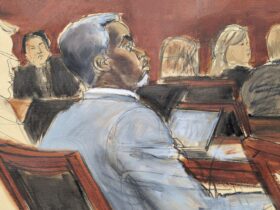




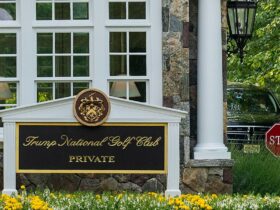




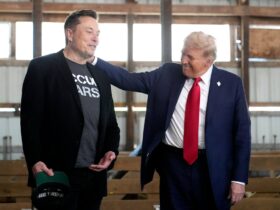
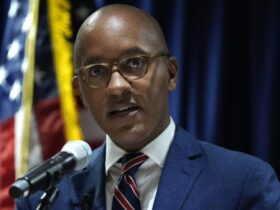
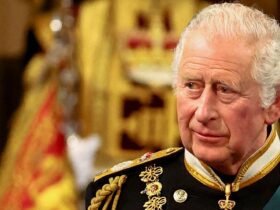
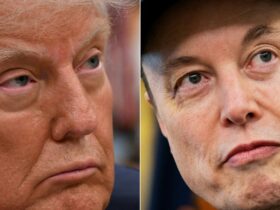
Leave a Reply